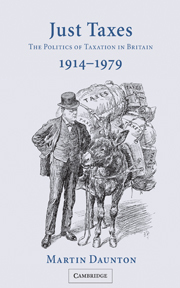Book contents
- Frontmatter
- Contents
- List of figures
- List of tables
- Preface
- List of abbreviations
- 1 The taxing state: an introduction
- 2 ‘The limits of our taxable capacity’: war finance, 1914–1918
- 3 ‘This hideous war memorial’: debt and taxation, 1918–1925
- 4 ‘Adjusting the particular turns of the different screws’: reforming the income tax, 1920–1929
- 5 ‘The great conflict of modern politics’: redistribution, depression and appeasement, 1929–1939
- 6 ‘The exigency of war’: taxation and the Second World War, 1939–1945
- 7 ‘The mortal blows of taxation’: Labour and reconstruction, 1945–1951
- 8 ‘A most injurious disincentive in our economic system’: Conservatives and taxation, 1951–1964
- 9 ‘Modern and dynamic economic policy’: Labour and taxation, 1951–1970
- 10 Rethinking taxation policy: from an opportunity state to an enterprise society, 1964–1979
- 11 ‘Highly defensible ramparts’: the politics of local taxation
- 12 Conclusion
- Appendix: chancellors of the Exchequer and prime ministers, 1908–1983
- Bibliography
- Index
12 - Conclusion
Published online by Cambridge University Press: 23 December 2009
- Frontmatter
- Contents
- List of figures
- List of tables
- Preface
- List of abbreviations
- 1 The taxing state: an introduction
- 2 ‘The limits of our taxable capacity’: war finance, 1914–1918
- 3 ‘This hideous war memorial’: debt and taxation, 1918–1925
- 4 ‘Adjusting the particular turns of the different screws’: reforming the income tax, 1920–1929
- 5 ‘The great conflict of modern politics’: redistribution, depression and appeasement, 1929–1939
- 6 ‘The exigency of war’: taxation and the Second World War, 1939–1945
- 7 ‘The mortal blows of taxation’: Labour and reconstruction, 1945–1951
- 8 ‘A most injurious disincentive in our economic system’: Conservatives and taxation, 1951–1964
- 9 ‘Modern and dynamic economic policy’: Labour and taxation, 1951–1970
- 10 Rethinking taxation policy: from an opportunity state to an enterprise society, 1964–1979
- 11 ‘Highly defensible ramparts’: the politics of local taxation
- 12 Conclusion
- Appendix: chancellors of the Exchequer and prime ministers, 1908–1983
- Bibliography
- Index
Summary
By 1979, there were few defenders of the British fiscal system as scientific, equitable and fair. On the contrary, it was widely seen as confused and even harmful. Economists were highly critical of the British tax system, complaining that its complexity, anomalies and loopholes imposed high compliance costs and distorted economic behaviour. New taxes were introduced and existing taxes modified for short-term reasons, without adequate discussion, and with sudden, incompatible changes. In 1978, John Kay and Mervyn King argued that the level of extraction had less impact on the economy than the ‘muddle and complexity’ of the tax system. In their opinion, taxes did not affect aggregate savings, but the way people saved was highly sensitive to the tax position of different forms of savings, and decisions might be guided by fiscal rather than economic efficiency. Indeed, Kay and King felt that the only rational response to the British tax system in the late 1970s was incredulity. ‘No one would design such a system on purpose and nobody did. Only a historical explanation of how it came about can be offered as a justification. That is not a justification, but a demonstration of how seemingly individually rational decisions can have absurd effects in aggregate.’
This book has provided a detailed historical explanation of how the British tax system came about, showing how individual decisions, each with a clear logic and rationale, produced confusion and growing dissatisfaction by 1979.
- Type
- Chapter
- Information
- Just TaxesThe Politics of Taxation in Britain, 1914–1979, pp. 360 - 369Publisher: Cambridge University PressPrint publication year: 2002



